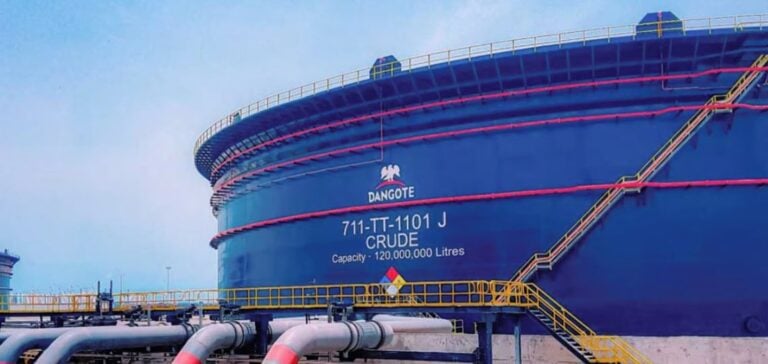The Dangote Oil Refinery, located at Ibeju-Lekki near Lagos, will start producing gasoline after an initial phase focused on products such as naphtha and kerosene.
This additional refining capacity represents a significant step forward for Nigeria, which, despite its oil production, remains heavily dependent on fuel imports.
According to Devakumar Edwin, Executive Vice President of Dangote, gasoline production trials are underway, and the entry of these new volumes into the Nigerian market will depend on the success of these tests and their integration into the distribution network.
The potential impact of this new production on the market is significant.
Local refining capacity, long perceived as a weak link in the Nigerian energy chain, is being strengthened.
However, the question of how to absorb these volumes within the existing infrastructure remains crucial.
The central role of the Nigerian National Petroleum Corporation Limited (NNPC Ltd), as the main importer of fuels, is also at stake, especially in a context of high debts and pressure on logistics flow management.
Implications for NNPC Ltd and the Fuel Market
NNPC Ltd is positioned as the exclusive buyer of gasoline produced by the Dangote refinery.
This import and distribution monopoly places NNPC Ltd in a complex situation, as it struggles to stabilize its finances.
The state-owned company currently faces a $6 billion liability to oil traders, a figure that weighs heavily on its ability to adjust its supply strategies.
The removal of subsidies, which has led to a 45% rise in prices, further complicates the situation.
Industry professionals are keeping a close eye on how NNPC Ltd will manage these new fuel volumes.
The viability of this integration will depend not only on debt management, but also on NNPC Ltd’s ability to maintain a balance between traditional imports and this new local source of supply.
Price volatility and budget constraints highlight the need for internal reforms to improve operational efficiency.
Logistics and Distribution: Anticipating Challenges
Integrating Dangote’s gasoline production into the existing network poses major logistical challenges.
NNPC Ltd’s infrastructure, already strained by volatile supplies and fluctuating demand, will need to be optimized to handle these new flows.
Storage and distribution bottlenecks are immediate risks that could limit the impact of Dangote’s production on the local market.
NNPC Ltd’s ability to adapt its storage infrastructures and fluidize the distribution chain is essential to maximize the benefits of this new refining capacity.
Industry experts believe that the success of this integration depends on effective coordination between NNPC Ltd and other market players.
Rigorous management of stocks and infrastructure is needed to avoid supply disruptions and ensure smooth distribution across the country.
The Nigerian fuel market remains particularly sensitive to disruptions, and the slightest failure could have considerable repercussions on the economy.
Strategic Outlook for the Nigerian Energy Sector
The development of local gasoline production by Dangote Oil Refinery could reduce Nigeria’s dependence on fuel imports, thereby improving its energy security.
However, for this initiative to be effective, close collaboration between public and private entities is required.
NNPC Ltd needs to restructure its financial commitments and streamline its supply chain to integrate these new volumes efficiently.
Transparency in transactions between NNPC Ltd and Dangote is crucial to maintaining market confidence and ensuring long-term stability.
Local energy companies and international investors are watching this development closely, as it could transform the refined products landscape in Nigeria.
Better management of local resources and optimization of logistics infrastructure could pave the way for broader reforms in energy sector governance, attracting new investment and strengthening the economy.





















